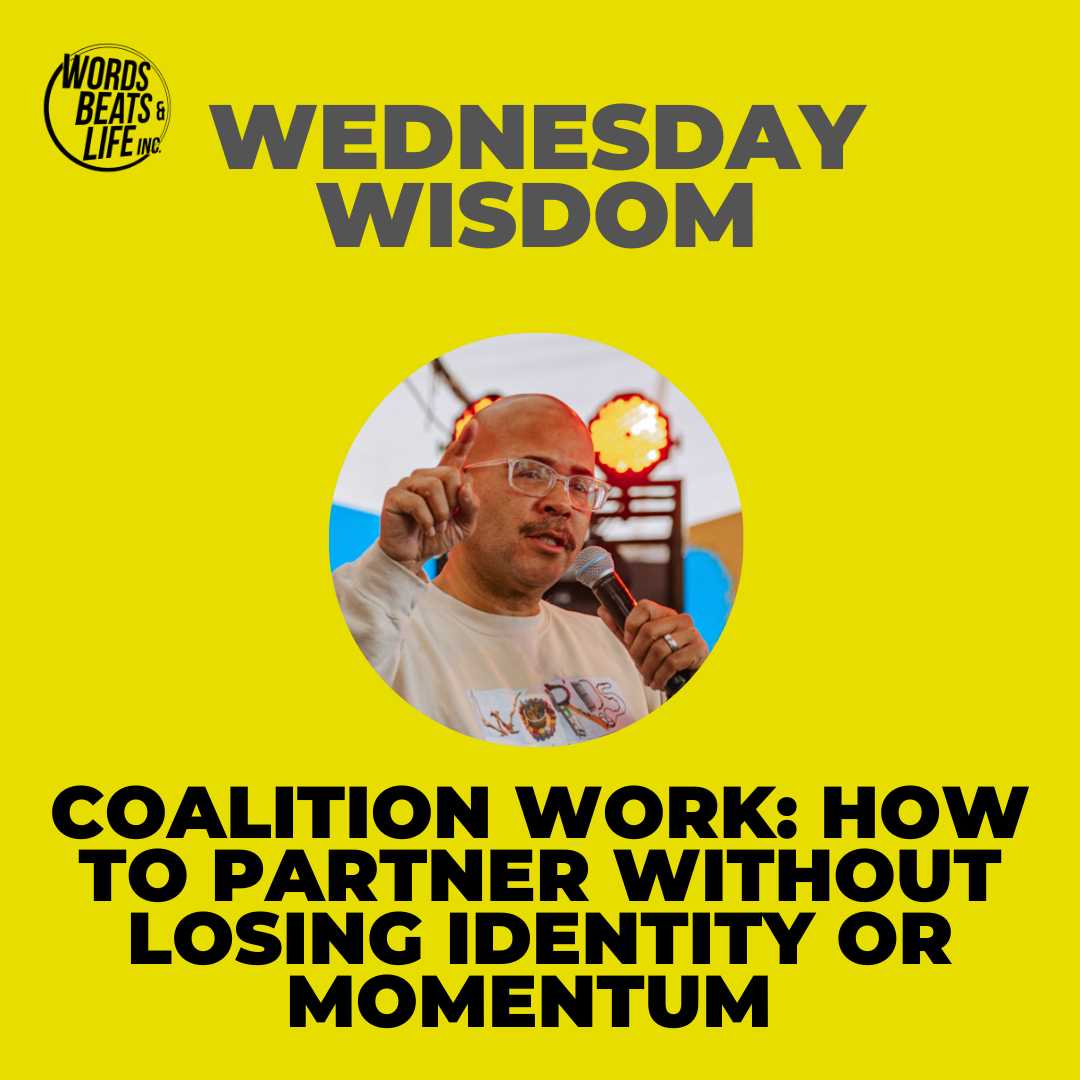He Talks With His Hands | An Interview with DJ RBI
A Words Beats & Life day one and Events & Programs Director, Ron “DJ R.B.I.” Brown, sits with WBL Marketing Director and fellow DJ, d.painter, to discuss cultural shifts and his journey with WBL over the last 20-years.
Dominic: How'd you meet Mazi?
RBI: I believe I met Mazi at the University of Maryland, College Park (UMCP), [at a conference]. He had a hand in it, 'cause he was one of the judges at a DJ battle there. Mazi didn't have a watch to keep time so I let him borrow my watch, that's how I met Mazi. And I didn't get my watch back for like 3 months.
Dominic: Haha! Well I guess there were no hard feelings about that because y'all are still working to this day. At what point after that conference did you become aware of Words Beats & Life (WBL)?
RBI: I was doing that play called A Rhyme Deferred with my man Jabari Exum, Kamilah Forbes, Chadwick Boseman and Priest Da Nomad… just our local poetry and hip-hop scene putting this thing together. We had just come back from the road and they booked us over at UMCP and they had us as part of the WBL conference. What Mazi wound up doing is talking to, [I believe] Nyakya Brown, about having me come down and do a DJ workshop during the conference. That was my first work relationship outside of doing the play with what later became known as Words Beats & Life inc.
Dominic: [As WBL started growing beyond UMCP], were you there at the Benning Park Recreational Center when the Academy first started?
RBI: I think I was at the first one. Mazi had done day-long workshops which I believe were at UMCP and the Community College of Baltimore County at Essex. I feel like those were informal test runs for how things would go at Benning park, because [soon after] Benning became a weekly thing. But I was definitely there.
Dominic: Seeing as the academy went from one-offs to weekly classes to the citywide program it is now, how has your approach to teaching DJing changed?
RBI: Number 1, when I first started with WBL, Serato [DJ software] wasn't a thing. We were using traditional vinyl, 2 turntables and a mixer. We were still using our eyes, ears, and our hands but there was no screen to look at. What you were looking at was the placement of your hand and the cue marks on your records in order to consistently find and manipulate whatever sounds on the record. Once Serato came into play you could actually see the [song's sound wave] on the computer screen which made things a little easier in terms of the [teaching] speed. Also, it made things easier in terms of collective learning. It's a different thing when you have a computer screen in front of you 'cause everyone can see the same thing at the same time and I don't have to have anyone interpret things more abstractly.
Now, we don't even have to use turntables, we can use a controller which is a facsimile of a traditional set up. That's one of the major things. [The technology] changed the ways students [can be involved] in class because they don't have to bring records in, they can have their own songs [they made] and put them on a usb or download them and we are off and running. It kind of catapulted a lot of things in terms of them being able to contribute their own stuff as well.
Dominic: When WBL started in the early 2000’s, that was a cultural turning point in hip-hop's crossover appeal but you still had students who remember it being underground. Now, especially if you're talking about a 15 year old, hip-hop is just a thing that's always been there and an activity to make money off of. In the 20 years of WBL how have you seen a shift in the motivation to learn DJing in your classes?
RBI: Benning Park is a lot different in terms of median motivation and interest versus [WBL's home office at] Newton St. At Benning we were bringing in DJing as a practice they could participate in but it was very much optional. The people who got involved with it, there was a curiosity there, but it was the hood [so students were] being influenced by popular culture and the
interest came down to, "how much money can you make? Can you buy a nice car from DJing? Do the girls sweat you?" You can have a class that goes from 15 students to 5 students because of the amount of time you have to put [into learning the skills]. The upside to that, the ones that did remain dedicated became really good at it. I remember one student went to college and was DJing a little bit so he was able to take that down there and make a little money. Being amongst that scene he ventured off and got into photography, but being a DJ [was what] put him in a position where he was even able to find [that] other interest.
Moving ahead to [the Academy at] Newton St., we had different waves. One of our initial classes…and when I say classes I'm talking about the different groups that would come 2 to 3
years apart… I saw the widening of the genre appreciation, then I saw a narrowing of the genre appreciation and then another widening of the genre appreciation. What I mean by that is, initially, we had guys that came in that were kind of into hip-hop, R&B, reggae, and what you would consider black musical styles. They were learning a lot of the techniques that [come] from hip-hop and reggae culture. The EDM (Electronic Dance Music) guys started coming and they
didn't really have an interest in learning the hip hop techniques so much at first, but they learned them and still applied it. Some kids came in and thought everything about EDM was new and didn't understand that house music and techno are American art forms, that dubstep had existed in the late 90s as a sub-genre popular in Europe. It served as a bridge in a lot of ways so they got to learn about Cybotron, Ten City, Timbaland, The Eurythmics and relating that to what was happening currently in electronic music.
A couple years after that, that kind of fell out of vogue with our new students. Our new groups were into old school hip-hop! It's just interesting how that thing moves around.
So, that includes the appreciation for old school [tools] like real records, turntables and mixers contrasting the use of controllers, knobs and FX. So, that includes the appreciation for old school [tools] like real records, turntables and mixers contrasting the use of controllers, knobs and FX.
Dominic: With your involvement with multiple institutions in DC that are preserving the legacy of true hip-hop culture, from WBL to the National Museum of Hip-Hop, What's the importance of this work?
RBI: It's the importance of having that lifeline, having some continuity [to the] base skills, the culture. The younger the [students] are, in certain instances, the less connection they have with the fact that this was a hard fought battle for this [music] to maintain some kind of legitimacy as an art form. The content of popular music is very narrow and has nothing to do with culture… I boil it down to just feelings and materialism, you know what I'm saying. Also, now the barrier to entry is not high, which I think is a good thing, but at the same time there's a strong lack of appreciation for the fact that this thing has its own idioms There are certain [disciplines] that [need to] keep a structure and what happens over time is it can get lost! These things take time to learn in a lot of ways, and we have shorter attention spans. The [new technology offers] a lot more instant gratification.
RBI (cont): You have machines that if you press a button it can scratch for them. Some of the kids I teach would rather press the button to have it scratch for them than learn to scratch themselves. I think that's a problem. It's cool as a feature, but, you get to a point where it's so flat, it can become lifeless. I just think that's dangerous because people have put a lot of work into building this thing out to exist 40 some odd years later.
Words Beats & Life puts you in the position where you can learn the basics, understand it, relate it to culture because there's history behind it... there're things that happened in the 70s. 80s, 90s, 2000s... there's an evolution for it so now you understand where your seat is. I'm sitting in this seat because of what happened yesterday, and now I want to add to it so someone can come behind me and pick up from what I did. Hopefully you can make your mark in it and be lucky enough to have a bigger impact.








